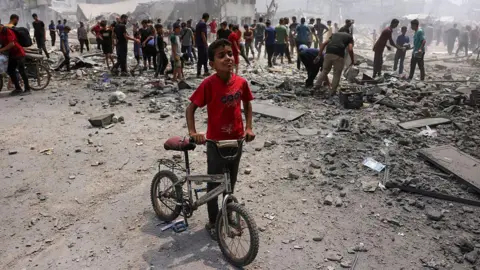**Gaza City Residents in Fear of Israeli Military Takeover Plans**
Residents of Gaza City are expressing deep concern and fear following the Israeli government’s recent announcement regarding plans to take control of the territory’s largest city. In interviews, locals conveyed their apprehensions about the impact of these plans, articulating a sense of despair and hopelessness in the face of potential military action. The narrative indicates that the announcement has amplified the already dire humanitarian situation in Gaza, which has struggled under prolonged conflict and blockades.
A Gaza City resident, identified as Abu Mohammad, articulated the frustrations felt by many civilians caught in the crossfire of geopolitical power struggles. “We are peaceful civilians. We have nothing to do with what is happening. Netanyahu knows that,” he stated, highlighting a disconnect between governmental decisions and the realities faced by ordinary people. The sentiments of the residents reflect a common thread: a sense of being trapped between conflicting forces, with military and political leaders not bearing the brunt of the consequences as civilians do.
The plans, which were approved by Israel’s security cabinet, aim to disarm Hamas, facilitate the release of hostages, and establish security control over Gaza City, which is home to approximately one million individuals. However, the residents are cautious, fearing that such military oversight could lead to increased violence and further humanitarian crises. The United Nations has already condemned these plans, warning that they could lead to “massive forced displacement and more unbearable suffering.”
Within the community, voices of despair have emerged. One woman reported, “It’s going to be totally disastrous.” She, alongside others in Gaza, anticipates that any Israeli military involvement will ultimately exacerbate existing humanitarian woes, pushing the densely populated city deeper into a state of chaos and suffering. The fear extends beyond mere displacement; it encapsulates an overarching dread of losing lives, homes, and what little stability they have managed to cling onto.
Dr. Hatem Qanoua, another local resident, conveyed his emotional turmoil. “We’re collapsing across every aspect of life: food, education, healthcare,” he lamented, indicating that the ramifications of ongoing conflict are not just immediate but long-lasting. With more than 61,000 lives claimed since the escalation began on October 7, 2023, the emotional struggle for Gaza’s citizens is compounded by the threat of further conflict and loss.
Despite these dire warnings, there are residents who express their deep-seated anger not just at the Israeli government but at Hamas as well. They are frustrated by a perceived lack of negotiation skills to seek an end to the violence. Influencer Ehab al-Helou, in a heartfelt social media post, criticized Hamas leadership for their failure to understand the gravity of their people’s suffering, calling their decision-making a “sacrifice” of the populace.
The response from community members varies, with some demonstrating a refusal to evacuate their homes despite the looming threat. Sabrine Mahmoud recounted her previous experiences with displacement and her resolve not to go through that humiliation again. Her statements reveal a painful history steeped in loss and suffering, as many residents share similar stories of trauma.
Others shared their frustrations with the evacuation process itself, referring to it as a “game” played by the authorities, where the stakes are nothing less than their lives. This collective trauma leads to feelings of despair, pushing some residents to seek assistance from the international community. Um Ahmad Shalah expressed a desire for compassion from foreign nations while lamenting the immediate humanitarian needs that are currently unmet.
The food crisis worsens day by day, with the World Health Organization indicating that malnutrition has taken lives across Gaza, underscoring the desperation of the situation. The intricate web of despair, fear, and anger demonstrated by Gaza’s residents portrays a community on the brink, grappling with both the impending military plans and their ongoing humanitarian crisis. As the situation continues to unfold, voices from Gaza City remain grounded in a shared commitment to surviving even as their environment grows increasingly hostile and complex.











